Unit 7 Will people have robots Section A 1a-2d 课件(共44张PPT)
文档属性
| 名称 | Unit 7 Will people have robots Section A 1a-2d 课件(共44张PPT) |
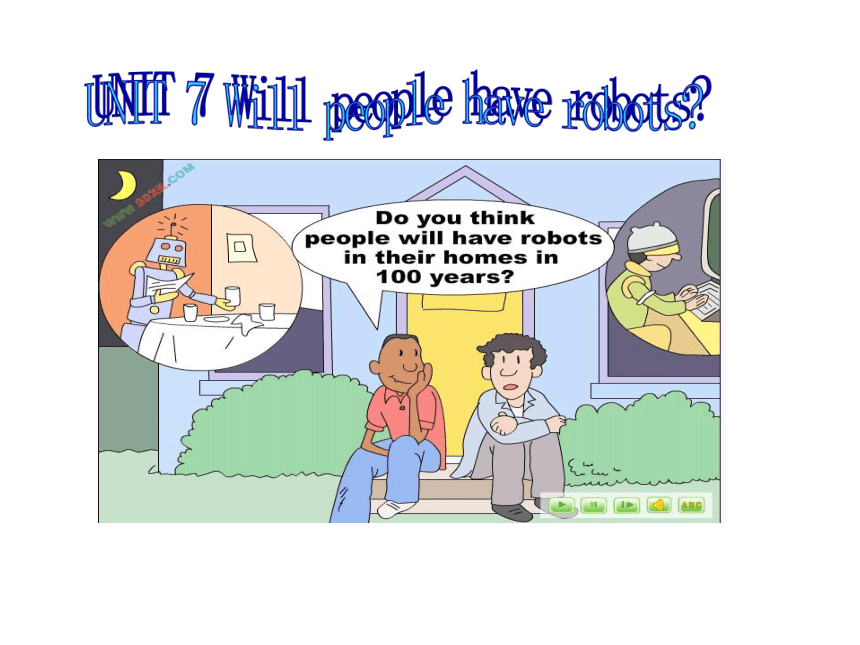
|
|
| 格式 | zip | ||
| 文件大小 | 2.3MB | ||
| 资源类型 | 教案 | ||
| 版本资源 | 人教新目标(Go for it)版 | ||
| 科目 | 英语 | ||
| 更新时间 | 2019-11-14 00:00:00 | ||
图片预览

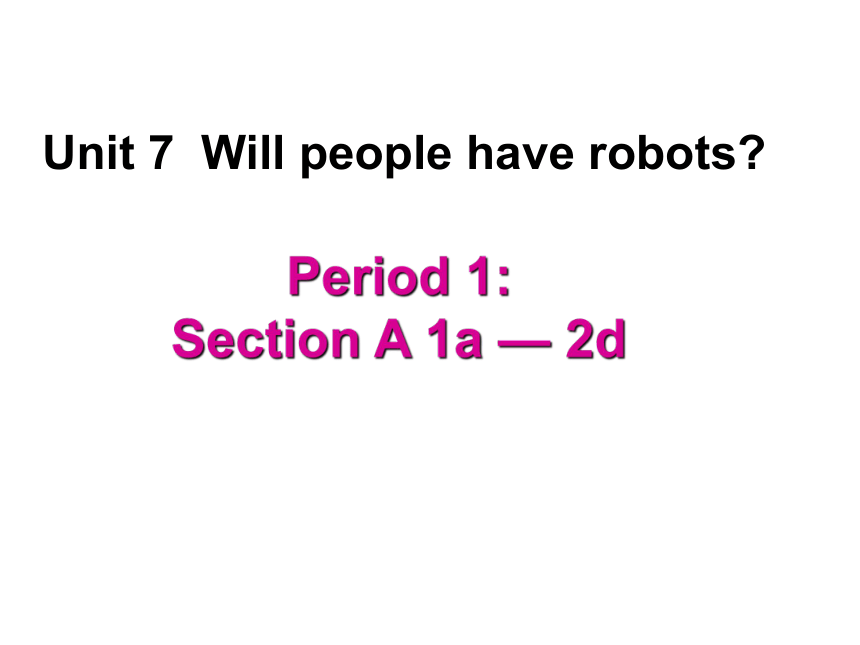
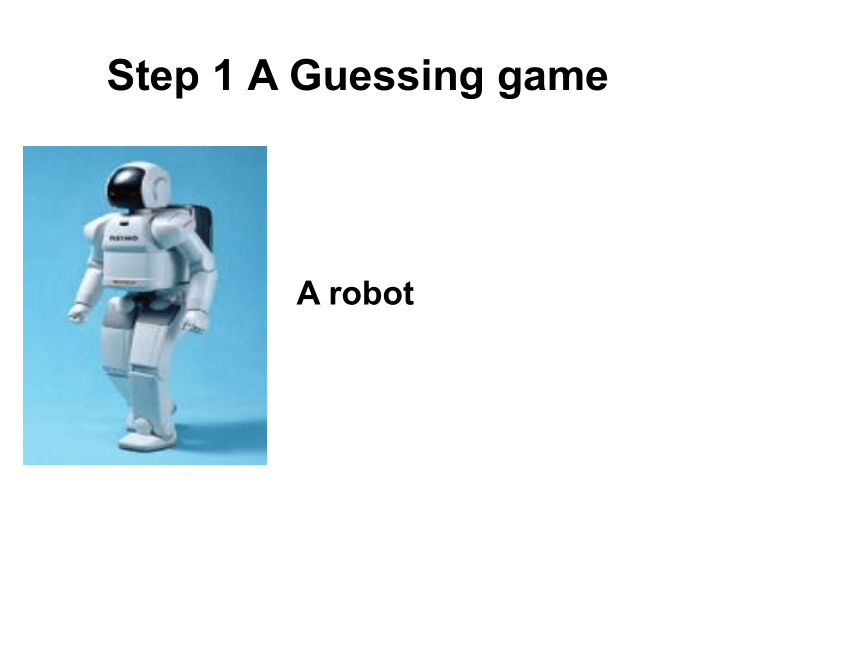
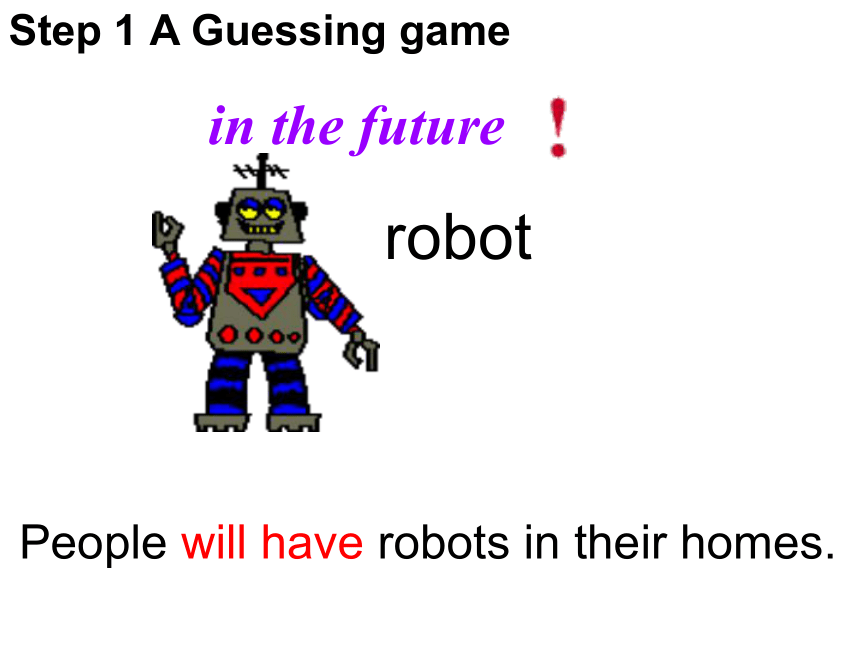
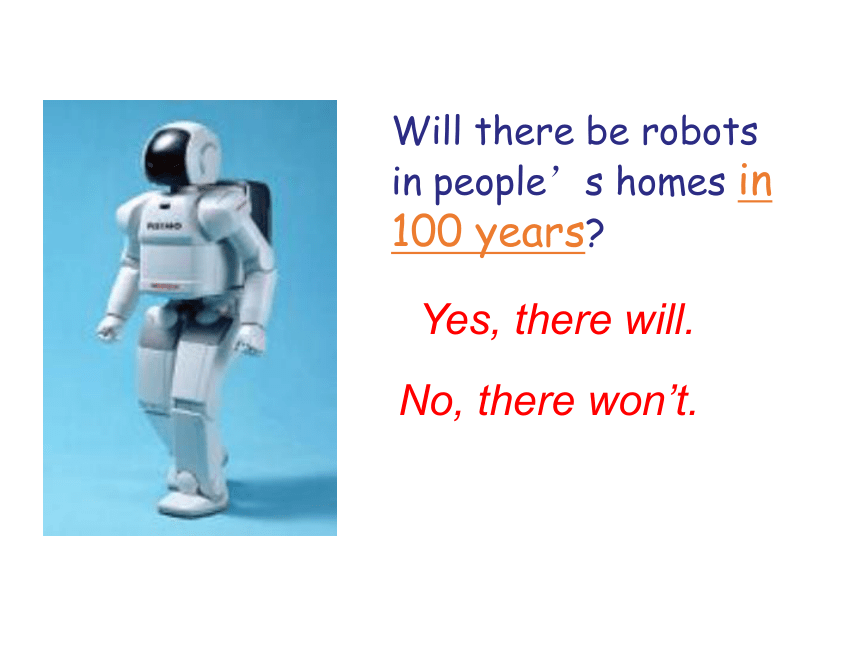
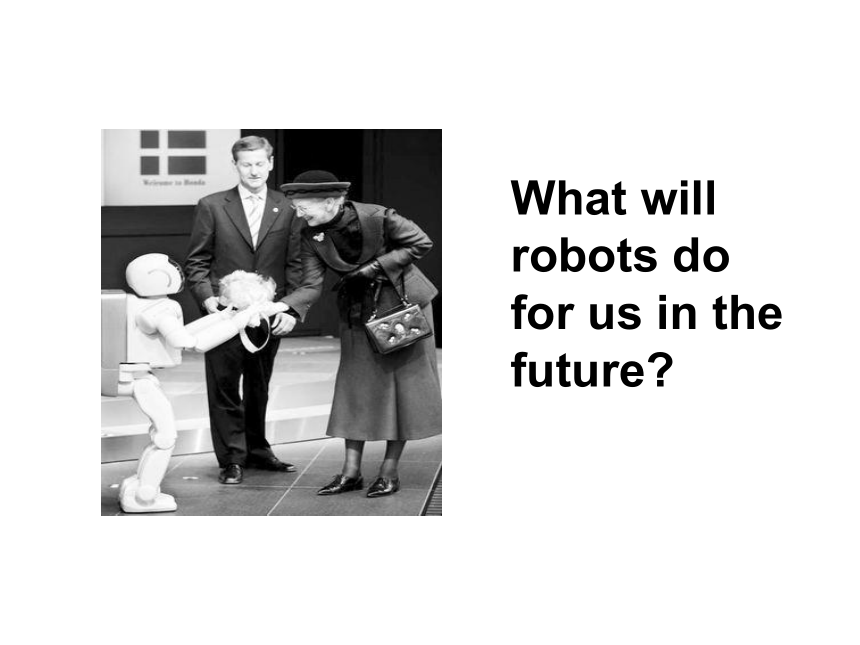
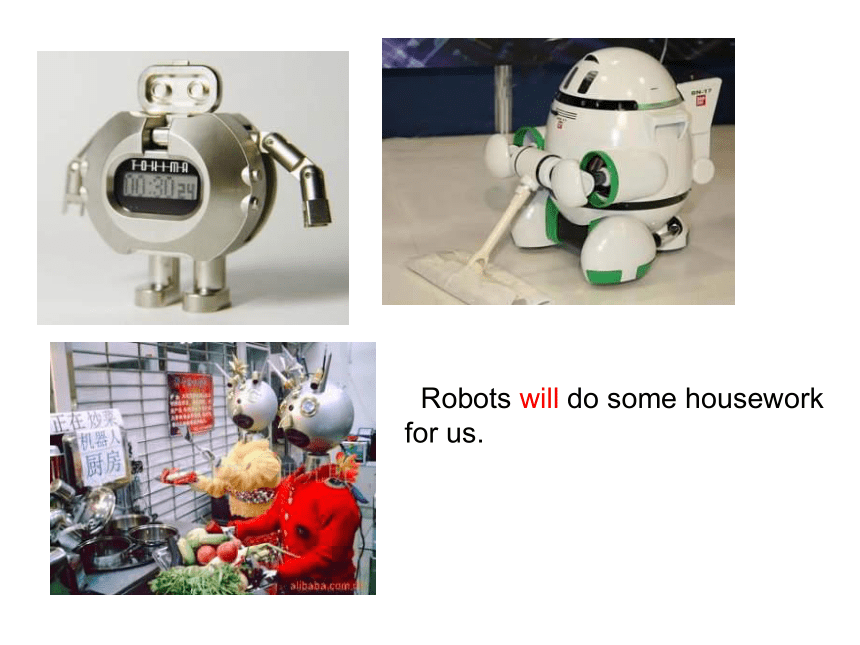
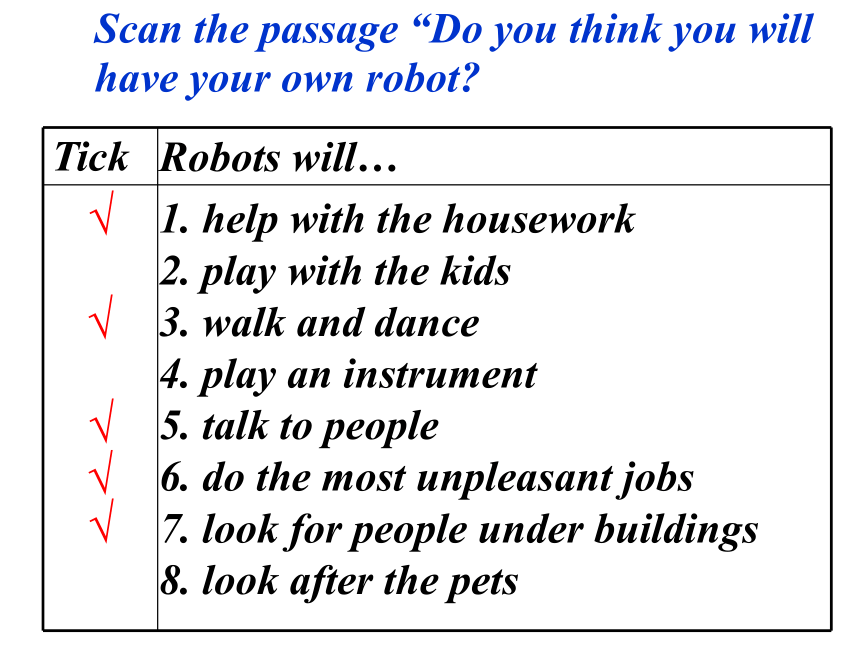

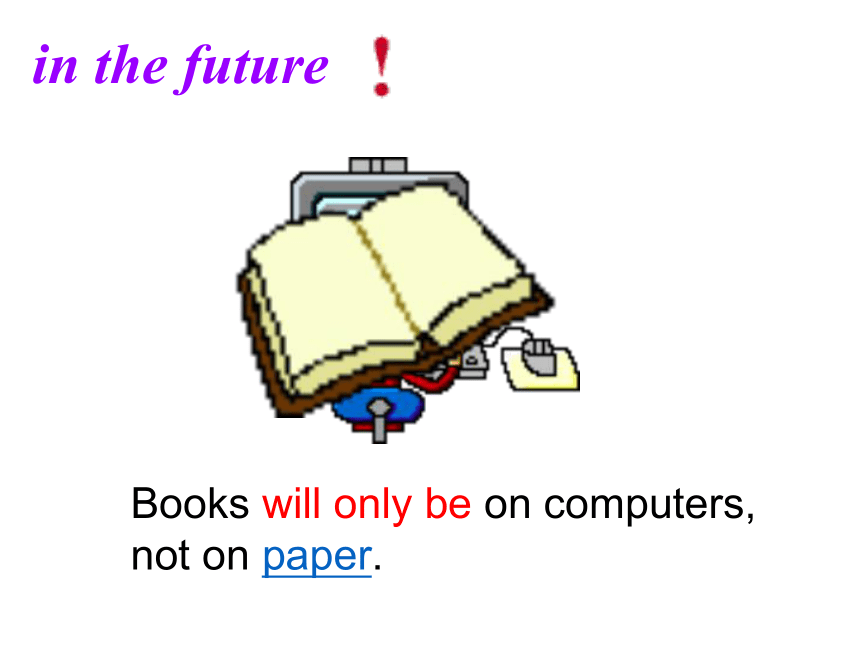
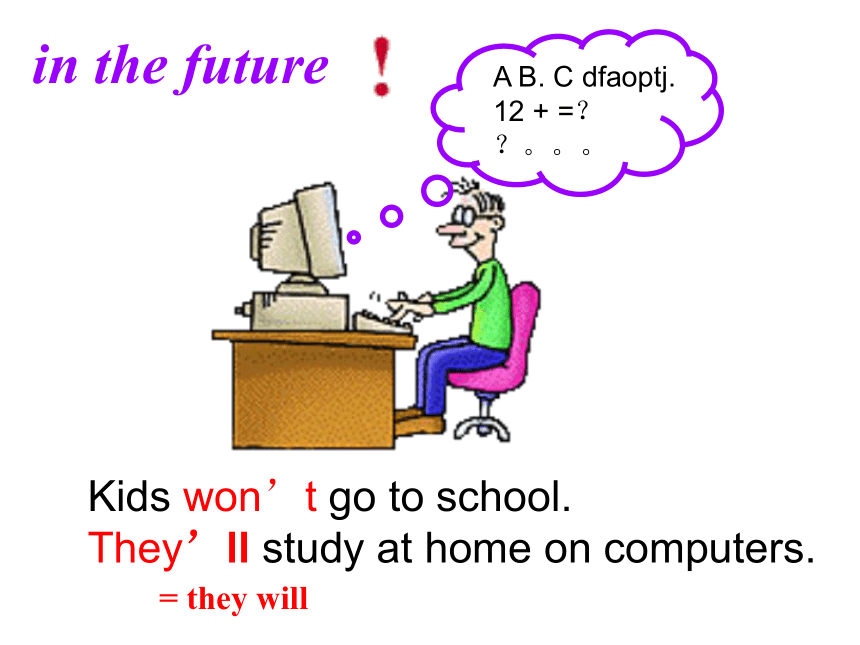
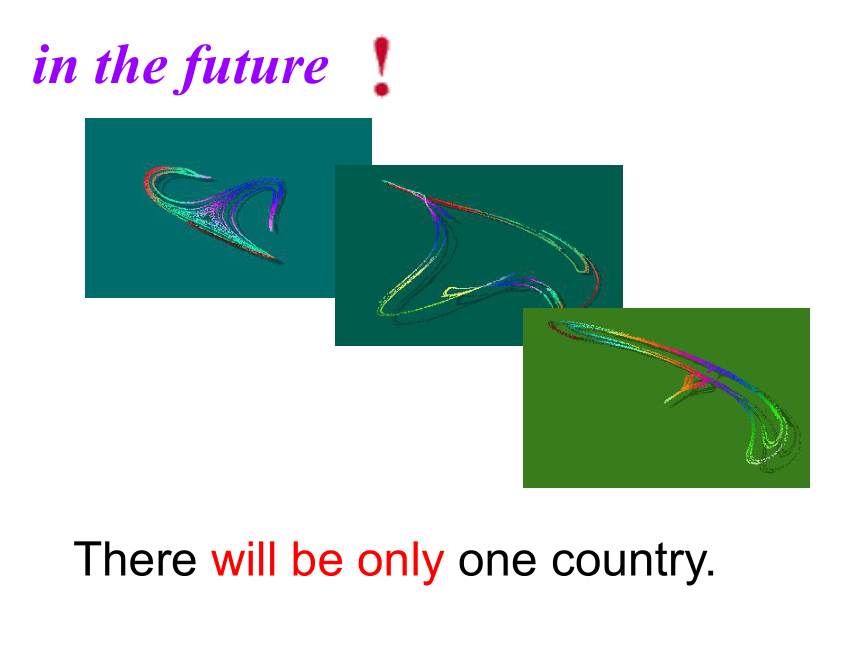
文档简介
课件44张PPT。UNIT 7 Will people have robots?
Period 1:
Section A 1a — 2d
Unit 7 Will people have robots?Step 1 A Guessing game A robotrobotPeople will have robots in their homes.in the futureStep 1 A Guessing game Will there be robots in people’s homes in 100 years?Yes, there will. No, there won’t.What will
robots do
for us in the future?
Robots will do some housework for us.Robots will…
1. help with the housework
2. play with the kids
3. walk and dance
4. play an instrument
5. talk to people
6. do the most unpleasant jobs
7. look for people under buildings
8. look after the petsTick√√√√Scan the passage “Do you think you will have your own robot?√in the futurePeople won’t use money.
Everything will be free.免费的won’t= will not使用in the futureBooks will only be on computers, not on paper.in the futureKids won’t go to school.
They’ll study at home on computers.= they willin the futureThere will be only one country.in the futureThere will be only one country.People will live to be 200 years old活到Game time:
I am the great predictor(预言家)Jay ZhouIn 10 years, what will he be like?Will he get married?
Yes, he will./ No, he won’t.
Will he have child?
Yes, he will./ No, he won’t.
Will he play basketball?
Yes, he will./ No, he won’t.
…Ask and answer in pairs.Summary:一般将来时 (1) 一般将来时的用法:
a.表示将要发生的动作或情况;
b.不以人的意志为转移,肯定要发生的事情。
(2) 一般将来时的构成:由助动词shall或will加动词原形构成,shall用于第一人称。在口语中,will在名词或代词后常简略为’ll,will not常简略为won’t. (4)一般将来时的时间状语:
tomorrow(明天), the day after tomorrow(后天),
next…(下个……), soon(不久), one day(某天),
from now(从今后), in…(time)(在……时间之后),
in the future(在将来)等。(3) 一般将来时态的肯定、否定和疑问结构可表示如下: will / shall引导的一般将来时:一般将来时表示将来发生的动作或情况,最基本的结构:will / shall + 动词原形
“主谓(宾)句型”的一般将来时:
肯定句:主语+ will / shall +动词原形+(宾语)+其他成份
People will have robots in their homes.
否定句:在will / shall 的后面加not即可。will not = won’t
People will not (won’t) have robots in their homes.
一般疑问句:把will / shall 提到句子主语之前,结尾变问号。
Will people have robots in their homes?
特殊疑问句:特殊疑问词+will +主语+动词原形+其他成份?
When will people have robots in their homes?“There be”句型的一般将来时
肯定句: There will be +名词+其他成份
[注意]:无论后面加单数名词或复数形式,be都必须用原形。
There will be only one country.
否定句:在will后面加not.
There won’t be only one country.
一般疑问句:把will提到there之前。
Will there be only one country?
Yes, there will. / No, there won’t.请用will完成下面的句子。
1. I _________ (visit) her this Saturday.
2. _________ you _________ (go) to school tomorrow?
3. They _________ (not buy) train tickets. 1. I ________ (visit) my uncle tomorrow.
2. There _______ (be) a football match in our school next week.
3. He ________ (help) you with your English this evening.
will visit will be will help用一般将来时填空。 4. They ________ (play) soccer if it doesn’t rain.
5. We _________ (have) a meeting tomorrow. will play will have1a How will the world be different in the future, 100 years from now? Read these predictions. Check (√) A (for agree) or D (for disagree). A D 1. People will have robots in their homes.
A D 2. People won’t use money. Everything will be free.
A D 3. Books will only be on computers, not on paper.
A D 4. Kids won’t go to school. They’ll study at home on computers.
A D 5. There will only be one country.
A D 6. People will live to be200 years old.= will not= they will纸使用预言;预测;预示1b Listen and circle the predictions you hear in activity 1a. 1. People will have robots in their homes.
2. People won’t use money. Everything will be free.
3. Books will only be on computers, not on paper.
4. Kids won’t go to school. They’ll study at home on
computers.
5. There will only be one country.
6. People will live to be 200 years old. Tapescript: A:Do you think _______________________ ___________in 100 years? B:Yes,I do. I saw a robot on TV, and it cleaned the kitchen. A:Well, ______________________________. B:Do you think____________________? A:Yeah,probably. B:I think______________________. A:Only one country in the whole world? Will there be world peace? B:I hope so. people will have robots in their homesI don’t think people will use moneyeverything will be freethere will be one countryWill people use money in 100 years?No, they won’t.
Everything will be free.(1c)Ask and answer questions about the predictions in 1a 1c PAIRWORK Ask and answer questions about the predictions in activity 1a.A: Will people use money in 100 years?
B: No, they won’t. Everything will be free. Will people
live to be 200 years old?
A: Yes, they will.一百年后“in与after+时间” 都可表示“在…之后”。当它们用于一般将来时态时,in后接“时间段”,after后接“时间点”。
1. He’ll come back in three years. 他三个小时以后回来。
2. He’ll come back after three o’clock. 他三点钟以后回来。单项选择。 1. —Will people live to be 300 years old? —_________. A. No, they aren't B. No, they won't
C. No, they don't D. No, they can't 2. There will be _________ pollution this year than last year. A. fewer B. much C. less D. many 3. I think people here are friendly. Do you agree _________ me? A. with B. to C. on D. from 4. —Where is Miss Wang? —She went to Hainan Island last week and will return _________ six days. A. ago B. later C. behind D. in
5. —_________ will they play? —They will play football. A. What subject B. What sport C. What food D. What language more, less, fewerfewer 较少的,few的比较级,用于修饰可数名词
more 较多的,much 和many的比较级,用于修饰可数名词不可数名词
less 较少的,little的比较级,用于不可数名词 more buildingsmore/fewer treesmore free timeless waterSummaryIn 100 years…
There will be ___________ houses.
There will be ___________ pollution.
There will be ___________ schools.
There will be ___________ people.
There will be ___________ snow.
There will be __________ movie theaters.Answers: more, less, fewer, more, less, fewerWill we have robots in our homes?
What will our world be like in 100 years?
Could you make some predictions?
Please talk with your partner.
Free talk预言;预测;预示There will be…
People will have…there will be lessmore pollution.污染I predict…there will be more/fewer carsthere will be fewer/more people2a Listen and circle the words you hear.1. There will be more / less / fewer people.
2. There will be more / less / fewer free time.
3. There will be more / less / fewer cars.
4. There will be more / less / fewer pollution.
5. There will be more / less / fewer trees.(little的比较级)较少(few的比较级)较少数树Remember:
many—more—most much—more—most
few—fewer—fewest little—less—least
修饰可数名词 修饰不可数名词_____ 1. There will be fewer people.
_____ 2. There will be less free time.
_____ 3. People will use the subways less.
_____ 4. There will be more pollution.
_____ 5. Cities will be very big and crowded.
2bListen again and check the predictions you hearPairwork Change the predictions into questions and ask each other these questions.
For example:
A: Will there be less free time in the future?
B: No, there won’t. There will be more free time. Because robots will do a lot for people. more peoplemany peopleFind the difference pollutionless pollutionfew treesfewer treesfew treesfewer trees(2c)Make conversations about
the predictions in 2a and 2b. A: What’s your prediction about the future?
B: I think there will be more pollution.
A: Really? I don’t think so.
But I think there will be fewer trees. Find out and learn the language points in the conversationa book about the future
in great danger
on the earth
play a part in
(That) sounds cool! 一本关于未来的书处于极度危险中在地球上在某方面起作用那听起来很酷!Role –play the conversation of 2d.将下列句子译成英文。
一百年后人们将会拥有机器人。
People __________ ________robots in 100 years.
每样东西都将会免费吗?
__________everything __________ __________?
将来污染会很严重吗?
__________ __________ __________much pollution? Ⅰ. 将下列句子译成英语。
1. 明天的城市汽车会更少,地铁会更多。
There ___________ ___________ ___________cars and _________subways in the city.
2. 城市的污染会更少,人口会更多。
There _________ ________ __________ _________ more people in the city tomorrow.
3. 这位老人非常健康,他可以活到100多岁。
The old man is very healthy, he can _________ _________ ________ over 100 years old.1. 书籍将会仅仅在电脑,而不在纸上。 Books _____ only _____ on computers, not _____ paper. 2. 今后在这座城市将会有更多的树木,更少的污染。 There will _____ _____ trees and _____ pollution in the city in future. 3. 五年前萨莉还在上大学。 Sally was _____ college five years _____. 4. 你认为十年后你的朋友会做什么职业? _____ do you think your friend will _____ _____ ten years? 5. 他们不会去野营。我确信他们将来参加我们的聚会的。 They _____ go camping. They _____ come to our party, I’m sure. Ⅱ. 仿照例句改写句子。
1. I feel sick today. (be better tomorrow) I’ll be better tomorrow.
2. Gina has six classes today.(have a lot of homework tonight)
________________________
3. I’m tired now.(sleep later)________________________________
4. My parents need a new car. (buy one soon)_________________________
5. We can’t leave right now. (leave a little later)______________
6. The weather is awful today.(fine tomorrow) ________________Homework Imagine what your school or your classroom will be like in the future. Write an short report. Then report before the class in the next class. Title: Our School in Future Thank you !
Period 1:
Section A 1a — 2d
Unit 7 Will people have robots?Step 1 A Guessing game A robotrobotPeople will have robots in their homes.in the futureStep 1 A Guessing game Will there be robots in people’s homes in 100 years?Yes, there will. No, there won’t.What will
robots do
for us in the future?
Robots will do some housework for us.Robots will…
1. help with the housework
2. play with the kids
3. walk and dance
4. play an instrument
5. talk to people
6. do the most unpleasant jobs
7. look for people under buildings
8. look after the petsTick√√√√Scan the passage “Do you think you will have your own robot?√in the futurePeople won’t use money.
Everything will be free.免费的won’t= will not使用in the futureBooks will only be on computers, not on paper.in the futureKids won’t go to school.
They’ll study at home on computers.= they willin the futureThere will be only one country.in the futureThere will be only one country.People will live to be 200 years old活到Game time:
I am the great predictor(预言家)Jay ZhouIn 10 years, what will he be like?Will he get married?
Yes, he will./ No, he won’t.
Will he have child?
Yes, he will./ No, he won’t.
Will he play basketball?
Yes, he will./ No, he won’t.
…Ask and answer in pairs.Summary:一般将来时 (1) 一般将来时的用法:
a.表示将要发生的动作或情况;
b.不以人的意志为转移,肯定要发生的事情。
(2) 一般将来时的构成:由助动词shall或will加动词原形构成,shall用于第一人称。在口语中,will在名词或代词后常简略为’ll,will not常简略为won’t. (4)一般将来时的时间状语:
tomorrow(明天), the day after tomorrow(后天),
next…(下个……), soon(不久), one day(某天),
from now(从今后), in…(time)(在……时间之后),
in the future(在将来)等。(3) 一般将来时态的肯定、否定和疑问结构可表示如下: will / shall引导的一般将来时:一般将来时表示将来发生的动作或情况,最基本的结构:will / shall + 动词原形
“主谓(宾)句型”的一般将来时:
肯定句:主语+ will / shall +动词原形+(宾语)+其他成份
People will have robots in their homes.
否定句:在will / shall 的后面加not即可。will not = won’t
People will not (won’t) have robots in their homes.
一般疑问句:把will / shall 提到句子主语之前,结尾变问号。
Will people have robots in their homes?
特殊疑问句:特殊疑问词+will +主语+动词原形+其他成份?
When will people have robots in their homes?“There be”句型的一般将来时
肯定句: There will be +名词+其他成份
[注意]:无论后面加单数名词或复数形式,be都必须用原形。
There will be only one country.
否定句:在will后面加not.
There won’t be only one country.
一般疑问句:把will提到there之前。
Will there be only one country?
Yes, there will. / No, there won’t.请用will完成下面的句子。
1. I _________ (visit) her this Saturday.
2. _________ you _________ (go) to school tomorrow?
3. They _________ (not buy) train tickets. 1. I ________ (visit) my uncle tomorrow.
2. There _______ (be) a football match in our school next week.
3. He ________ (help) you with your English this evening.
will visit will be will help用一般将来时填空。 4. They ________ (play) soccer if it doesn’t rain.
5. We _________ (have) a meeting tomorrow. will play will have1a How will the world be different in the future, 100 years from now? Read these predictions. Check (√) A (for agree) or D (for disagree). A D 1. People will have robots in their homes.
A D 2. People won’t use money. Everything will be free.
A D 3. Books will only be on computers, not on paper.
A D 4. Kids won’t go to school. They’ll study at home on computers.
A D 5. There will only be one country.
A D 6. People will live to be200 years old.= will not= they will纸使用预言;预测;预示1b Listen and circle the predictions you hear in activity 1a. 1. People will have robots in their homes.
2. People won’t use money. Everything will be free.
3. Books will only be on computers, not on paper.
4. Kids won’t go to school. They’ll study at home on
computers.
5. There will only be one country.
6. People will live to be 200 years old. Tapescript: A:Do you think _______________________ ___________in 100 years? B:Yes,I do. I saw a robot on TV, and it cleaned the kitchen. A:Well, ______________________________. B:Do you think____________________? A:Yeah,probably. B:I think______________________. A:Only one country in the whole world? Will there be world peace? B:I hope so. people will have robots in their homesI don’t think people will use moneyeverything will be freethere will be one countryWill people use money in 100 years?No, they won’t.
Everything will be free.(1c)Ask and answer questions about the predictions in 1a 1c PAIRWORK Ask and answer questions about the predictions in activity 1a.A: Will people use money in 100 years?
B: No, they won’t. Everything will be free. Will people
live to be 200 years old?
A: Yes, they will.一百年后“in与after+时间” 都可表示“在…之后”。当它们用于一般将来时态时,in后接“时间段”,after后接“时间点”。
1. He’ll come back in three years. 他三个小时以后回来。
2. He’ll come back after three o’clock. 他三点钟以后回来。单项选择。 1. —Will people live to be 300 years old? —_________. A. No, they aren't B. No, they won't
C. No, they don't D. No, they can't 2. There will be _________ pollution this year than last year. A. fewer B. much C. less D. many 3. I think people here are friendly. Do you agree _________ me? A. with B. to C. on D. from 4. —Where is Miss Wang? —She went to Hainan Island last week and will return _________ six days. A. ago B. later C. behind D. in
5. —_________ will they play? —They will play football. A. What subject B. What sport C. What food D. What language more, less, fewerfewer 较少的,few的比较级,用于修饰可数名词
more 较多的,much 和many的比较级,用于修饰可数名词不可数名词
less 较少的,little的比较级,用于不可数名词 more buildingsmore/fewer treesmore free timeless waterSummaryIn 100 years…
There will be ___________ houses.
There will be ___________ pollution.
There will be ___________ schools.
There will be ___________ people.
There will be ___________ snow.
There will be __________ movie theaters.Answers: more, less, fewer, more, less, fewerWill we have robots in our homes?
What will our world be like in 100 years?
Could you make some predictions?
Please talk with your partner.
Free talk预言;预测;预示There will be…
People will have…there will be lessmore pollution.污染I predict…there will be more/fewer carsthere will be fewer/more people2a Listen and circle the words you hear.1. There will be more / less / fewer people.
2. There will be more / less / fewer free time.
3. There will be more / less / fewer cars.
4. There will be more / less / fewer pollution.
5. There will be more / less / fewer trees.(little的比较级)较少(few的比较级)较少数树Remember:
many—more—most much—more—most
few—fewer—fewest little—less—least
修饰可数名词 修饰不可数名词_____ 1. There will be fewer people.
_____ 2. There will be less free time.
_____ 3. People will use the subways less.
_____ 4. There will be more pollution.
_____ 5. Cities will be very big and crowded.
2bListen again and check the predictions you hearPairwork Change the predictions into questions and ask each other these questions.
For example:
A: Will there be less free time in the future?
B: No, there won’t. There will be more free time. Because robots will do a lot for people. more peoplemany peopleFind the difference pollutionless pollutionfew treesfewer treesfew treesfewer trees(2c)Make conversations about
the predictions in 2a and 2b. A: What’s your prediction about the future?
B: I think there will be more pollution.
A: Really? I don’t think so.
But I think there will be fewer trees. Find out and learn the language points in the conversationa book about the future
in great danger
on the earth
play a part in
(That) sounds cool! 一本关于未来的书处于极度危险中在地球上在某方面起作用那听起来很酷!Role –play the conversation of 2d.将下列句子译成英文。
一百年后人们将会拥有机器人。
People __________ ________robots in 100 years.
每样东西都将会免费吗?
__________everything __________ __________?
将来污染会很严重吗?
__________ __________ __________much pollution? Ⅰ. 将下列句子译成英语。
1. 明天的城市汽车会更少,地铁会更多。
There ___________ ___________ ___________cars and _________subways in the city.
2. 城市的污染会更少,人口会更多。
There _________ ________ __________ _________ more people in the city tomorrow.
3. 这位老人非常健康,他可以活到100多岁。
The old man is very healthy, he can _________ _________ ________ over 100 years old.1. 书籍将会仅仅在电脑,而不在纸上。 Books _____ only _____ on computers, not _____ paper. 2. 今后在这座城市将会有更多的树木,更少的污染。 There will _____ _____ trees and _____ pollution in the city in future. 3. 五年前萨莉还在上大学。 Sally was _____ college five years _____. 4. 你认为十年后你的朋友会做什么职业? _____ do you think your friend will _____ _____ ten years? 5. 他们不会去野营。我确信他们将来参加我们的聚会的。 They _____ go camping. They _____ come to our party, I’m sure. Ⅱ. 仿照例句改写句子。
1. I feel sick today. (be better tomorrow) I’ll be better tomorrow.
2. Gina has six classes today.(have a lot of homework tonight)
________________________
3. I’m tired now.(sleep later)________________________________
4. My parents need a new car. (buy one soon)_________________________
5. We can’t leave right now. (leave a little later)______________
6. The weather is awful today.(fine tomorrow) ________________Homework Imagine what your school or your classroom will be like in the future. Write an short report. Then report before the class in the next class. Title: Our School in Future Thank you !
同课章节目录
- Unit 1 Where did you go on vacation?
- Section A
- Section B
- Unit 2 How often do you exercise?
- Section A
- Section B
- Unit 3 I'm more outgoing than my sister.
- Section A
- Section B
- Unit 4 What's the best movie theater?
- Section A
- Section B
- Unit 5 Do you want to watch a game show?
- Section A
- Section B
- Unit 6 I'm going to study computer science.
- Section A
- Section B
- Unit 7 Will people have robots?
- Section A
- Section B
- Unit 8 How do you make a banana milk shake?
- Section A
- Section B
- Unit 9 Can you come to my party?
- Section A
- Section B
- Unit 10 If you go to the party, you'll have a grea
- Section A
- Section B
